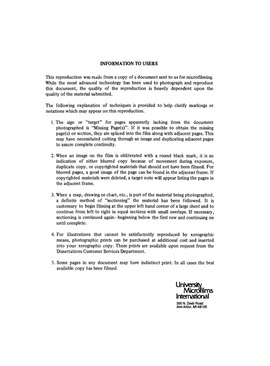| dc.contributor.author | Willis, Gordon Wayne, | en_US |
| dc.date.accessioned | 2013-08-16T12:28:45Z | |
| dc.date.available | 2013-08-16T12:28:45Z | |
| dc.date.issued | 1982 | en_US |
| dc.identifier.uri | https://hdl.handle.net/11244/5042 | |
| dc.description.abstract | Athens in the fourth century was socially chaotic, suffering from the consequences of the Peloponnesian War and the failure of the Golden Age. Many leading thinkers sought to restore stability and greatness to Athens through education. The sophists tried to do this by teaching social success, while the Socratics tried to transmit Truth and develop virtue. Isocrates' views clearly fall on the sophistic side. | en_US |
| dc.description.abstract | Isocrates' educational philosophy was found to be very similar to that of modern pragmatic educators like John Dewey, John Childs and Boyd Bode. Their greatest differences were in the implementation of that philosophy in education, where Isocrates emphasized rhetoric, the authority of the teacher, and the role of the native ability of the students. | en_US |
| dc.description.abstract | Isocrates developed a philosophy based on the ideas of Protagoras and Gorgias of Leontini. He believed man cannot know ultimate reality (if there is such) and therefore rejected all metaphysical speculation as useless. He believed certain knowledge to be beyond human grasp but placed considerable confidence in opinions based on experience. His agnostic epistemology produced a relativistic axiology. Isocrates described human nature as rational, communicative and active. He believed education to be sharply limited by the innate abilities of the individual student. | en_US |
| dc.description.abstract | This study examines the educational philosophy of Isocrates, the leader of the Rhetorical School in Athens in the fourth century B.C. It described the cultural situation in ancient Athens as it related to Isocrates' educational thought, described his educational philosophy and practice, and compared his views to modern educational pragmatism. | en_US |
| dc.description.abstract | The aim of Isocrates' education was to develop the abilities of students to think clearly, communicate persuasively and act effectively. He hoped his students would use their education to promote the political aim of panhellenism. The educational method of the Rhetorical School was modeled after the methods of physical training in the palaestra. It involved instruction and practice, which, combined with native ability, would lead to creative competence. The curriculum was based on one central element, rhetoric, but included a broad range of topics since students were expected to be able to speak well on any subject. | en_US |
| dc.format.extent | vi, 92 leaves ; | en_US |
| dc.subject | Education, History of. | en_US |
| dc.title | A critical study of the educational thought of Isocrates. | en_US |
| dc.type | Thesis | en_US |
| dc.thesis.degree | Ph.D. | en_US |
| dc.thesis.degreeDiscipline | Jeannine Rainbolt College of Education | en_US |
| dc.note | Source: Dissertation Abstracts International, Volume: 43-06, Section: A, page: 1858. | en_US |
| ou.identifier | (UMI)AAI8225519 | en_US |
| ou.group | Jeannine Rainbolt College of Education | |
